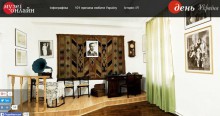The Lypynskys’ family mansion in the village of Zaturtsi is now a memorial museum and a monument of national importance. Yet Ivanna Voroshyliuk, a Volodymyr-Volynsky-born violinist and singer-songwriter, is right to think that the problem of such objects is the “nobody cares” attitude. It is difficult for them to survive because they are deep in the hinterland, she says. “Far from everybody will travel on their own in search of the hidden treasures of spirit… Even I learned about the Zaturtsi mansion from Myroslav Mosiuk, a Volodymyr-Volynsky-born Odesaite, one of the Ukrainian Sixtiers harassed by the Soviet system,” Ivanna confesses. Therefore, she launched a project, “Rediscover Lypynsky,” at the Zaturtsi museum. In addition to inviting Volynians to come and see the history of the people who were born as Poles but had Ukrainian blood flowing in their veins, Ivanna also posted in social networking sites a link to an online excursion to the Lypynskys museum on the Ukraine Incognita website, which the newspaper Den had prepared several years before.
“This young rural museum, albeit well known in and out of Ukraine, still needs good and high-quality advertising. A ludicrously low admission fee of five hryvnias for adults and three hryvnias for children is supposed to attract visitors. But our young people often choose establishments other than museums. So, it is very sad when you have taken so much effort to prepare a soiree or a concert, but the hall is half-empty. But this year, on the initiative of Ivanna Voroshyliuk, a young Kyiv-based violinist born in the princely city of Volodymyr-Volynsky, and thanks to Volodymyr Pavlik and Vasyl Voron, organizers from the oblast center, the Zaturtsi museum is receiving a variegated, very interested, and predominantly young-age group of Lutsk intellectuals who want to know the still unknown pages of Ukrainian history, touch the past with all their heart and soul and, at the same time, to spend a weekend well in a jolly good company,” museum staff member Natalia Hatalska says.
After hearing a gripping story about the Lypynskys family and its most prominent representative Viacheslav Lypynsky, the project participants from Lutsk, Volodymyr-Volynsky, and Novovolynsk watched a film about Lypynsky, Ukrainian-Group Polish Blood (by Mykola Hensetsky), and found themselves in a wonderful world of superb music and exalted poetry. Ivanna Voroshyliuk brilliantly played her own adaptations of Ukrainian folk songs for the violin. What also fitted in with the show was the appearance of Ihor Pavliuk, a well-known Ukrainian poet born in the Volynian village of Velyky Okorsk under the jurisdiction of the Zaturtsi village council. The museum soiree ended with a traditional St. Andrew’s feast ritual, the tasting of good wine and herbal tea. If you add to this that the guests were treated to the honey gathered by the bees in the neighboring Viacheslav Bilyk museum’s park, pickled mushrooms from the former landlord’s woods, cherry pies, pollution-free jacket potatoes, and sauerkraut grown on the villagers’ household plots, you can say that the improvised feast was a success.
“I think Ukrainians are still to appreciate Lypynsky’s heritage. This is why we do not know what the nation should rally around, what should unite it. And if politicians and people who live on the territory of Ukraine endorsed the idea of state-building territorial nationalism, we would have neither a population that despises its own country nor the politicians who sell out the country they swore to serve,” Voroshyliuk says. Incidentally, fragments from such important Lypynsky’s works as “Letters to Brothers Grain Growers” and “The Introductory Word for Readers from Hostile Camps” have been published in Den’s Library collection “Armor-Piercing Political Writing.”








